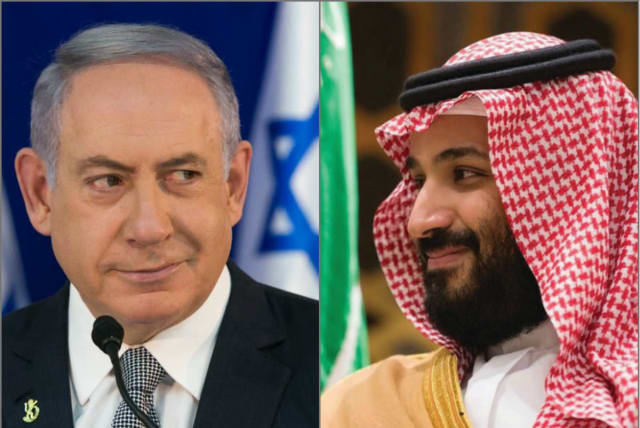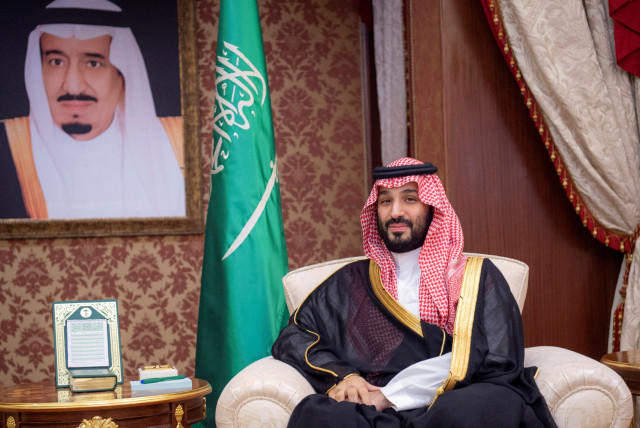'Haaretz' columnist is a strange opponent to Israeli-Saudi peace - opinion

In the past, the author was well known for writing highly controversial pieces attacking the ideas of the Israeli mainstream. Peace with Saudi Arabia is one of his new targets.
Haaretz featured an op-ed this week by one of its chief opinion writers, Rogel Alpher, provocatively titled “I oppose peace with Saudi Arabia.”
In the past, the author was well known for writing highly controversial pieces attacking the ideas of the Israeli mainstream, including the center-Left. Once talk of Israel concluding a peace treaty with Riyadh began to surface, as has been the case over the last year, Saudi Arabia became one of his new targets.
The main issue Saudi critics dealt with during that period were the allegations about the possible role of the Saudi Crown Prince Muhammad bin Salman (MBS) in authorizing the assassination of Saudi journalist and regime critic, Jamal Khashoggi, in Istanbul five years ago.
But Khashoggi was not even mentioned in the Haaretz piece. Neither was MBS. If Rogel Alpher was opposing an Israeli-Saudi peace, his position had nothing to do with this episode. What he did make clear, however, was that his considerations for the position he was taking primarily emanated from the impact of an Israeli-Saudi peace on Israeli domestic politics in the future, and its role in strengthening the present Israeli government.
Saudi Arabia: A potential partner for Israel going back many years
Actually, Saudi Arabia has been a potential strategic partner for Israel for many years. Looking back over the past century, the main adversaries of Riyadh in the Middle East were the Hashemite states, Jordan and Iraq, followed by Nasserist Egypt.
The great backers of the Hashemites were the British who supplied arms and training. They began the scramble for Middle East oil through their conglomerates, such as the Anglo-Persian Oil company, which secured the first oil concessions.
Anyone who studies the diplomatic documents from the end of the First World War can see that this was the main preoccupation of the early Saudi state – not the potential revival of a Jewish national home.
By the 1950s, once Moscow entered the Middle East mix, especially in Yemen, Israel and Jordan joined forces under the table to bolster the Imam of Yemen, while a pro-Soviet Yemen became the main danger to Saudi Arabia.
Soviet aircraft with Egyptian pilots attacked Saudi border towns. America had its own priorities, although US president John F. Kennedy approved the limited deployment of US fighters to help defend areas in the Saudi Kingdom that were being increasingly threatened.
The new strategic trends in the Middle East region have accentuated the need for Israeli coordination with its Saudi neighbor. Operating through its Yemeni allies, Saudi Arabia now had to contend with Iranian-supplied drones and cruise missiles that struck at Saudi oil facilities in 2019. The attack disrupted about 5% of global oil production and half of Saudi Arabia’s oil output.
The fact that Washington did not effectively counter these military dangers in the years that followed best explains the Saudi quest for new global partnerships with the Chinese and the Russians this year.
The writer served as the permanent representative of Israel to the UN and as the director-general of its Foreign Affairs Ministry.
Jerusalem Post Store
`; document.getElementById("linkPremium").innerHTML = cont; var divWithLink = document.getElementById("premium-link"); if (divWithLink !== null && divWithLink !== 'undefined') { divWithLink.style.border = "solid 1px #cb0f3e"; divWithLink.style.textAlign = "center"; divWithLink.style.marginBottom = "15px"; divWithLink.style.marginTop = "15px"; divWithLink.style.width = "100%"; divWithLink.style.backgroundColor = "#122952"; divWithLink.style.color = "#ffffff"; divWithLink.style.lineHeight = "1.5"; } } (function (v, i) { });

